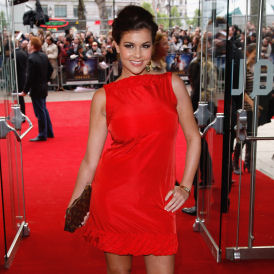Judges to publish verdict on super-injunctions
A major review led by judges and libel lawyers into the use of injunctions to gag the media is set to be published amid fears the legal tool is damaging freedom of speech in the UK.

There are growing concerns over celebrities increasingly using injunctions and so-called super-injunctions – whose very existence cannot be reported – to prevent publication of details about their private lives.
A married footballer is said to have used an injunction to prevent reporting of an alleged affair with former Big Brother contestant Imogen Thomas (pictured), and last month broadcaster Andrew Marr revealed he took out a super-injunction in 2008 to prevent the reporting of an affair.
On Thursday, an order granting anonymity to Sir Fred Goodwin was lifted at the High Court after a Peer revealed details of an injunction taken out by the former Royal Bank of Scotland boss regarding an alleged extra-marital affair.
It is thought that some 20-30 super-injunctions are in place to prevent publication of the details of the lives of the rich and famous, but due to their secret nature the exact figure is hard to pin down.
Review into super-injunctions
Now judges and libel lawyers are set to publish the findings of a year-long review into injunctions and super-injunctions, chaired by Lord Neuberger of Abbotsbury, the Master of the Rolls.
It is expected to recommend that the media will be allowed in to injunction hearings, but subject to reporting safeguards similar to those seen in the family courts. Judges will also still have powers to impose reporting restrictions to protect the identity of those concerned or the issues they want to keep secret.
Read more on sex, lies and super-injunctions
The review has also considered the problem of court orders being ignored on the internet.
Last week, an anonymous Twitter user ‘named’ celebrities who it claimed had obtained super-injunctions preventing the media from publishing certain stories.
But the posts included errors about celebrities such as Jemima Khan, who denied she had stopped publication of pictures of her with Jeremy Clarkson.
Concerns over privacy
Prime Minister David Cameron has in the past said he is “uneasy” over courts ruling on privacy in this way, but his spokesman said he would await the report before deciding how to proceed.
However, it is understood that Justice Secretary Kenneth Clarke and Culture Secretary Jeremy Hunt agreed that a Privacy Act is not the best option. Instead they are expected to suggest ministers produce more detailed guidance for judges to interpret the Human Rights Act.
-
Latest news
-
Police try to shut down right-wing event as Nigel Farage speaks3m

-
‘Many things Netanyahu has done I disagree with, but I’m not giving up on Israel’, says top-ranking Democrat4m

-
Could US House be about to vote on Israel, Ukraine aid bill?2m

-
Number of people out of work due to long-term sickness at record high3m

-
Creating deepfake porn to be made a criminal offence after C4 investigation6m

-




